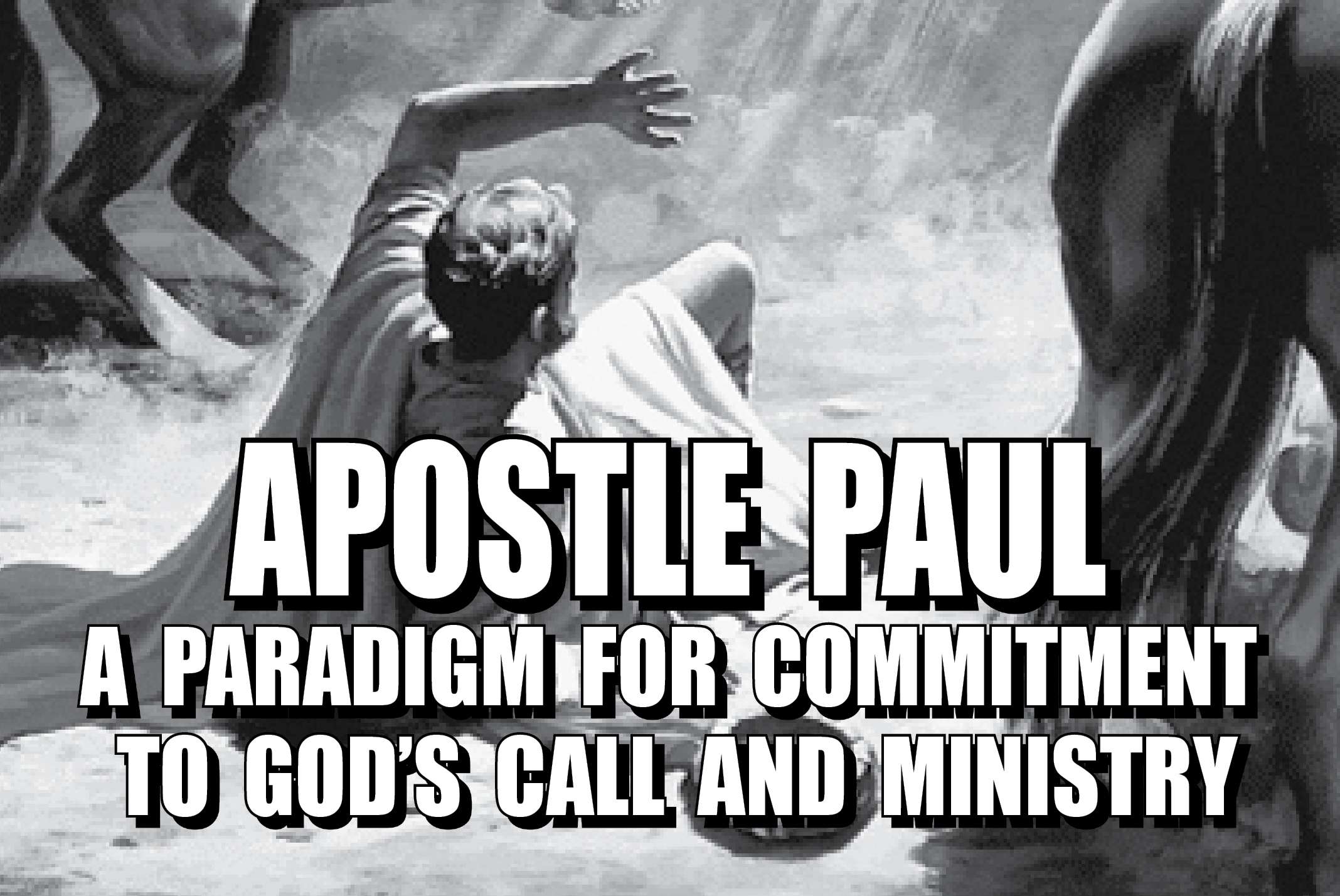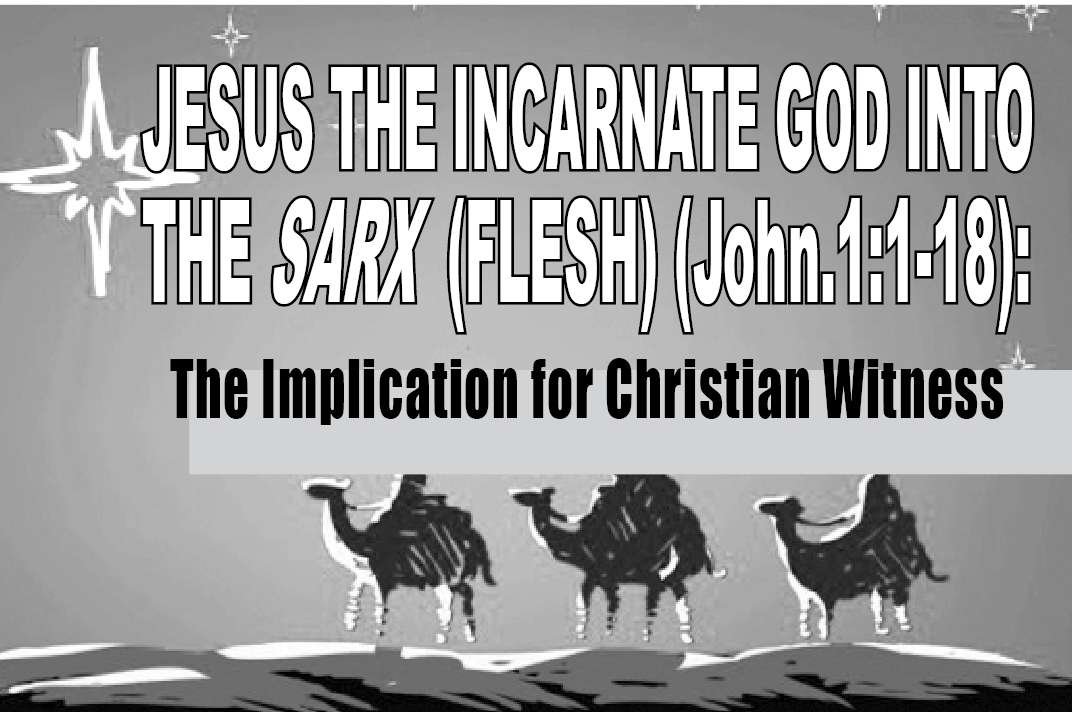

Apostle Paul a Paradigm for Commitment to God’s Call and Ministry
Dr. Jose L.
Paul is regarded as the greatest missionary unparalleled in Christian history. He is an example of commitment to God’s call to preach the gospel to the Jews and Gentiles. He was committed to the Jewish traditions before he was called and commissioned by the risen Lord. After his call and commission, he displayed a passionate zeal to preach the gospel of Christ, planting churches, safeguarding the ecclesia from heresies, serving fellow Christians and trying to bring unity in the body of Christ.
Paul’s commitment was to proclaim the gospel of Jesus Christ who gave him a special task of preaching the gospel specifically to the Gentiles. He established a number of churches and Christian communities in and around the Greco-Roman world. The commitment to the call helped him break the rigid traditions of Judaism and bring liberation to humanity through the gospel of Jesus Christ. It is Paul’s commitment and undivided loyalty to Christ that stands tall in his Christian life and ministry.
Paul’s Commitment to Christ: His Call and Commission
Paul’s commitment to Christ starts with the call and commission, widely designated 0as the ‘Damascus Christophany’ that changed the course of history (Rom.1:1-5; Gal.1:11-16; 2:6-8; 1Cor.9:1; 15:8). It was a personal call/commission by the risen Christ on the way to Damascus (Phil.3:4-17; Gal.1:15-16; 1Tim.1:12-16; Ac.9:1-20; 22:1-21 26:2-23). Before this encounter, he was committed to exterminate the Jesus movement by assaulting the infant church with great violence (Ac.7:58; 9:1-2; 1Cor.15:9; Gal.1:13, 23; Phil.3:6). It included imprisonment and torturing the minority Christians (Ac. 8:3; 22:4; 26:6) in the centres of Jewish diaspora where the members of Jesus movement had fled in order to escape the persecution (Ac.8:1; 11:1).
The divine revelation of the risen Lord made Paul to proclaim the gospel of God’s Son to the Gentiles (Rom.1:5). Through the Damascus Christophany, the persecutor of the early Christian movement became the persecuted for the cause of the gospel. This call/commission is similar to the theophanies of the prophetic calls of Isaiah and Jeremiah who were chosen by God for a specific task even before they were born (Isa.49:1,5; Jer.1:5). ‘But when God, who had set me apart before I was born and called me through his grace, was pleased to reveal his Son to me, so that I might proclaim him among the Gentiles, I did not confer with any human being’ (Gal.1:15-16). This revelation by God of his Son Jesus Christ resulted in a radical transformation of Paul’s values and commitments. Paul’s call was to create a new humanity in Christ include both the Gentiles and Jews. The Damascus Christophany and the subsequent commitment to Christ moved Paul passionately to preach the Gospel of Jesus Christ.
Paul’s Commitment to Preach the Gospel of Christ
Paul received a deep sense of obligation to preach the gospel both to Jews and Gentiles as part of the revelatory experience and commission (Rom.1:14-15). Paul says ‘woe to me if I do not preach the gospel’ (1Cor.9:16). His missionary motivation develops from the sense of responsibility to preach the gospel of Christ and he frequently employs the words ‘obligation,’ ‘debt’ or ‘debtor’ in this regard (Rom.1:14). He considers himself to be an ‘ambassador for Christ’ who is committed to make his appeal through us (2 Cor.5:20). Paul’s former advantages were considered as so punyin the light of the new revelation in Christ (Phil.3:7-8). The commitment to be an ambassador of Christ to the Gentiles makes a universal dimension (Rom.1:5) which signifies the importance of the calling.
The proclamation of the gospel was the starting point of Paul’s missionary task. Paul was committed to preach the simple and pure gospel of Jesus Christ ‘because it is the power of God for the salvation of both Jews and Gentiles’ (Rom.1:16). For Paul, to preach the gospel (Gal.1:11) is to preach Christ (Gal.1:16). Through the gospel, God revealed his righteousness, that is, God’s righteousness is gained by faith alone (Rom.1:17). It is through the agency of Christ that God effected His salvation. The fourfold qualification of the gospel is about God’s sovereignty, the historical culmination of God’s promises through the prophets, the message about God’s Son, and the universal scope (Rom.1:1-4) (William J. Larkin Jr. and Joel F. Williams (eds.), Mission in the NT. An Evangelical Approach (Maryknoll, New York: Orbis Books, 2002, 67).
Paul became the champion of the universal law-free gospel of forgiveness through the crucified and exalted Son. The proclamation of the gospel is about the death and resurrection of Jesus Christ (Rom.1:14; 15:20; 16:25; 1Cor.1:18, 23; 15:1-4; Gal.1:8-9,16; Eph.3:8; Phil.1:15-18; Col.1:28). This message appeals to responding in faith and repentance (Rom.2:4; 2Cor. 7:9-10; 12:21). The gospel Paul preached was salvation that is inclusive of both Jews and Gentiles. This passionate commitment to preach the gospel resulted in the formation of communities.
Paul’s Commitment and the Formation of Churches in the Greco-Roman World
There was a phase in which the ministry of the disciples of Jesus were limited to the Jewish world. It was primarily Paul, who broke such boundaries and made the gospel available to the Gentile world. Even though Paul did not have the credentials like the twelve disciples turned apostles, he earned the credentials from the risen Christas a result of the Damascus Christophany and planted many churches in the Gentile world. Paul identifies himself as an apostle of Jesus Christ (Rom.1:1; 1 Cor.1:1; 2 Cor.1:1; Gal.1:1; Eph.1:1; Col.1:1). Similar to the authoritative commission of Jesus to his disciples, Paul’s apostolic commission also has the elements of authority, proclamation and universality.’ (Mission in the NT: An Evangelical Approach, 69).
Through the three noteworthy missionary journeys, Paul could establish many churches in the eastern part and later to the western part of the Mediterranean world. The challenge to his apostleship (2 Cor.10:1-33) did not deter his zeal for the proclamation of the gospel rather he fervently holds on to the position of his call. His work is proved not by the title but by the work he committed for the Lord. The ecclesial formation in Galatia, Asia Minor (Ephesus, Colossae), Macedonia (Philippi, Thessalonica), Achaia (Corinth) are concrete evidences of the fidelity to his missionary call and commitment.
As an apostle to the Gentiles, Paul is a pioneer evangelist. He did not go to the places the gospel was already preached (Rom.15:20-21). Further, he was conscious of his geographical pattern in his missionary career and he says that ‘from Jerusalem and as far round as Illyricum I fully preached the gospel of Christ’ (Rom.15:19). This statement explains the expansion of the ministry from the heart of Judaism (Jerusalem) to the western side of the Greco-Roman Gentile world. Then, he proceeds to Rome and later to Spain (Rom.15:24, 28). Travel to Rome is probably a satisfactory note of his mission to the end of the world because in the first century this was the capital of the empire. Thus reaching Rome would geographically bring Paul to the centre of the world.
Paul’s Pastoral Commitment to the Individual Churches
Paul’s commitment to the individual churches is expressed in his prayers for their fidelity and perseverance (1 Cor.1:4-9; Phil.2:14; 1Thess.3:5, 12-13; 5:23-24). He felt personal responsibility for the communities he had planted and thus wrote individual letters to them as a clear direction in their spiritual journey. His pastoral commitment is clearly displayed through dispatching at least four letters to the troubled church at Corinth (1Cor.5:9; 2Cor.2:3, 4,7,9; 7:8,12). Further, he personally visited the church at Corinth to settle the matters (2Cor.2:1;12:14,21; 13:1-2). He undertook two to three years of extended residential missions in Corinth (Ac.18:11) and Ephesus (Ac.19:8,10; 20:31).
Paul is considered to be a committed pastor who took care of the churches. He fed the flock through teaching and preaching. In his absence he appointed co-workers, Timothy and Titus to look after the churches. His commitment regarded him as the founding father to the churches in Corinth, Philippi and Thessalonica (1Cor.4:15; 2Cor.6:13; 12:14; Phil.2:22; 1Thess.2:11). His love for the individual churches explain his deep commitment for their spiritual growth (2 Cor.2:4; Phil.4:1,7; 2 Thess.2:17). Moreover, his constant prayer also portrays his sincere love for them (Phil.1:4-6; 1 Thess.3:10).
Paul’s Commitment to Serve the Fellow Christians
Paul claims his apostolic authority based on preaching the gospel and not on receiving financial support. He gives the reasons for his rejection of financial support (1 Cor.9:12, 15-19; 2 Cor.11:7-15; 2 Cor.12:13-18) i.e., ‘he serves only the gospel and not his own financial interests’ (J.M. Everts, “Financial Support” in Dictionary of Paul and His Letters, 296). However, while refusing financial support for his mission from the Corinthian church, Paul was requesting money from them for the cause of the poor and the needy (1Cor.16:1-4; 2Cor.8-9; Rom.15:26-32; Gal.2:9-10). He encourages the Corinthian church to give generously to the poverty stricken church in Jerusalem through which they will glorify God (2Cor.8 and 9). He points out the enthusiastic participation of the Macedonians (2Cor.8:1-15) as a model they also should follow (1 Cor.16:1-4).
The collection for the poor in Jerusalem is reported to the Galatian believers (Gal.2:10) and then to the Roman believers (Rom.15:25-32) show Paul’s commitment to the fellow Christians. Paul emphasises the contribution of the Macedonian and Achaian believers as a grateful response for the spiritual blessing they have received. Paul’s commitment for the unity of Jews and Gentiles in Christ is the major significance of the collection of money.
Paul’s Commitment to Unity in the Body of Christ
One of Paul’s aims in mission was not only founding churches but also nurturing Christian communities in the Greco-Roman world. For this purpose, he regularly revisited the churches and wrote letters to them. The Pauline letters are the best example of demonstrating his commitment to nurture the newly founded churches in the bond of love. Moreover, through warning and teaching he wants everyone to become mature in Christ (Col.1:28). He also emphasises the corporate nature of Christian existence.
Paul uses the body imagery to point out the significance of unity of the church. Paul reiterates the importance of the believers’ part in maintaining unity which would help the church to grow to maturity (Eph.4:1-16). It is only through the love the ecclesia will be able to achieve the unity (Eph.4:2,15,16). Paul admonishes the believers for the unity of Jew and Gentile by incorporating them into one body, the universal church (Eph.2:16; 3:6).Paul admonishes to avoid lying, anger, and destructive and unwholesome words that endanger harmonious relationships (Eph.4:25-5:2).
The body imagery is used by Paul “one body, many members” to point out the diversity within unity (1 Cor.12:12-13; Eph.4:7-16). Paul says there is a diversity of gifts and graces given to the church for the common good similar to the body is a unit with many parts contributing the organic whole. In the church there is a multiplicity of members and their functions (1 Cor.12:14-16) providing connections between the various parts. Paul admonishes the strong members of the body to consider the weaker members because they are indispensable for a proper corporate growth (1Cor.12:22-24). However, this body imagery is used to emphasise the mutual relationships and obligation of believers one to another and their union with Christ. This relationshipis necessary for the growth of the body, i.e., the church (1 Cor.12:21; Eph.4:16). The letter to the Colossians also identifies the body of Christ as the church (Col.1:24) and Christ is identified as the head of the body (Col.1:18). The mutual dependence is necessary for the growth of the church by holding fast to the head of the body i.e., the Christ (cf.Col.2:19). They also must relate to one another making his/her contribution according to the measure of its gifts and function (Eph.4:16). The mutual relationship between the body parts and to the head will result in the growth of the church.
Paul’s commitment for the corporate health of the churches spreads to bring the well-being of individuals. Paul greets twenty-seven people in the church at Rome signifies his commitment go deeper to the persons individually (Rom.16:3-16). He asks the church in Thessalonica to “admonish the idlers, encourages the faint-hearted, help the weak” (1Thess.5:14).
Paul’s Commitment to Safeguard the Ecclesia from Heresies
Paul expresses his anxiety for the perseverance of the local churches in 2 Cor.11:28. Paul’s commitment to God’s mission made him to be strong in his obligation to safeguard the doctrine of the church against the intruders in the churches of Galatia (Gal.1:6-9; 5:10, 12). As a committed pastor, Paul is instructing his co-workers (Titus in Crete and Timothy in Ephesus) in the context of increasing danger of counter mission by the Judaising-gnostic preachers (1Tim.1:3-7, 19-20; 4:1-2; 6;20; 2Tim.4:3-4; Tit.1:10-16). He entrusts them to appoint various church officers with qualifications so that the church would stand on the pillar and foundation of the truth (1Tim.2:15). No wonder, Paul could be treated as a paradigm for Christian commitment.
Implication for the Readers
Just like Paul is called to be an apostle to the Gentiles, we are also called by God to preach the gospel to everyone. God’s call is personal just like Jesus called the disciples to follow him. Behind the call there is a purpose to be fulfilled. The call is purely by God’s grace and there is no credit on our part. From the time of his call we must be fully committed to the task for which he called. The commitment to proclaim the gospel is through our life and ministry. The false apostles and the challenges from fellow Christians should not deter us from the obligation God laid on us. Just like Paul was committed to the unity in the body of Christ, we also must strive for the unity of the church in the context of division based on caste, colour, region, and creed etc. The imagery of the body is the best example to teach our churches forunity in diversity. The Indian church must consider the weaker members because they are indispensable for proper corporate growth of the church. The Indian church also must know that finance is not the basis for the proclamation of the gospel but the gospel is about God’s sovereignty, the message of God’s Son, and its universal scope.








